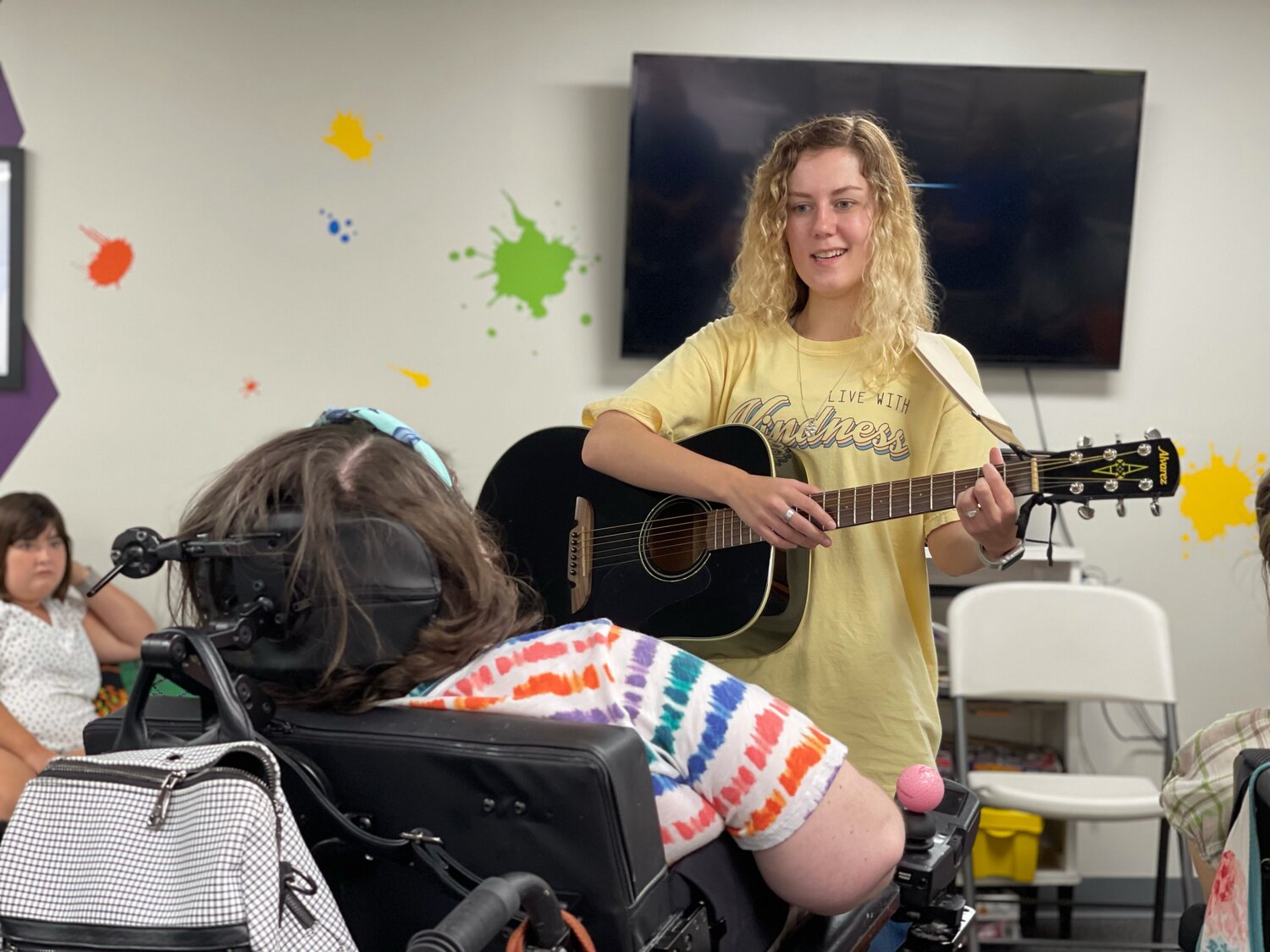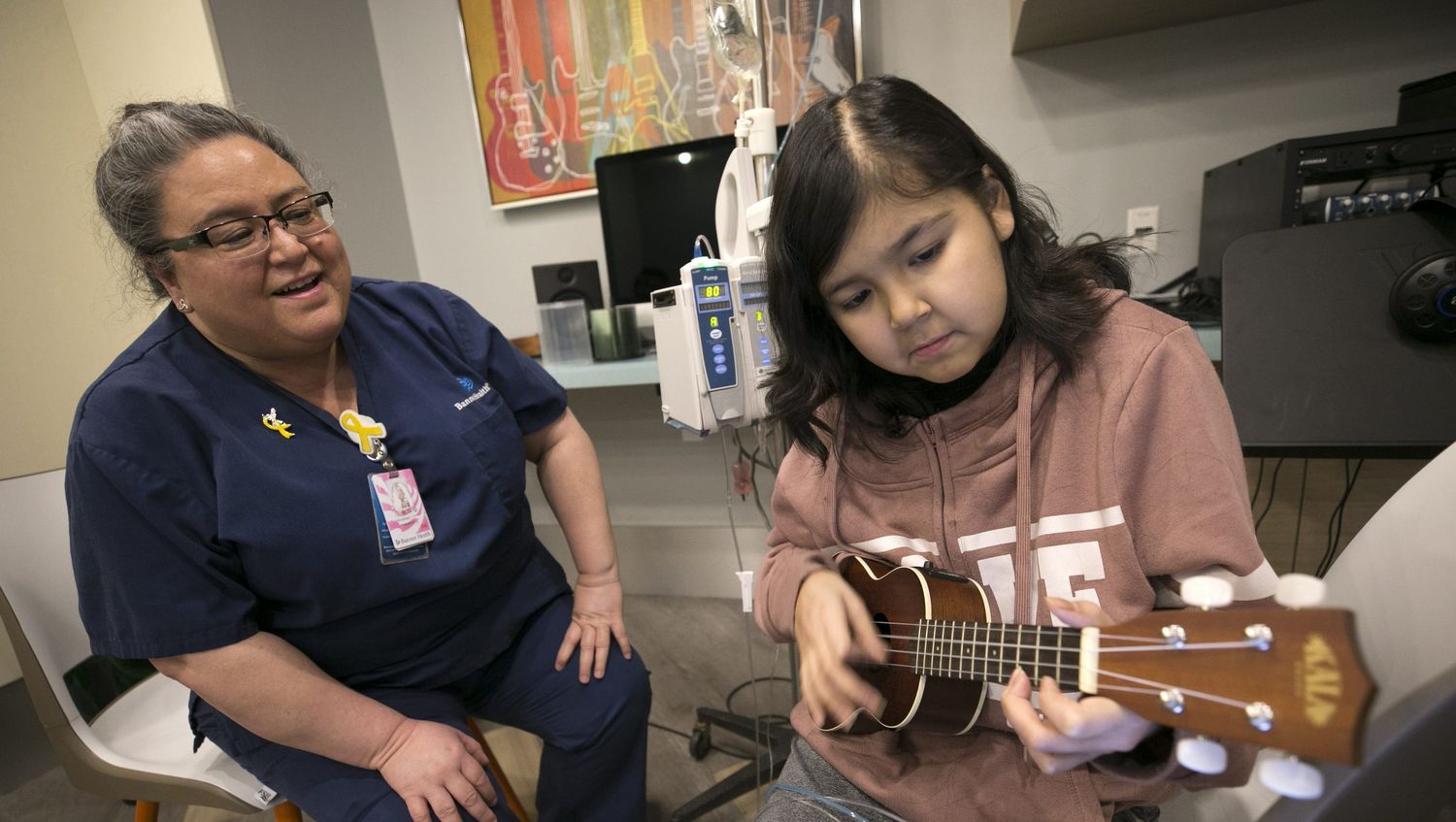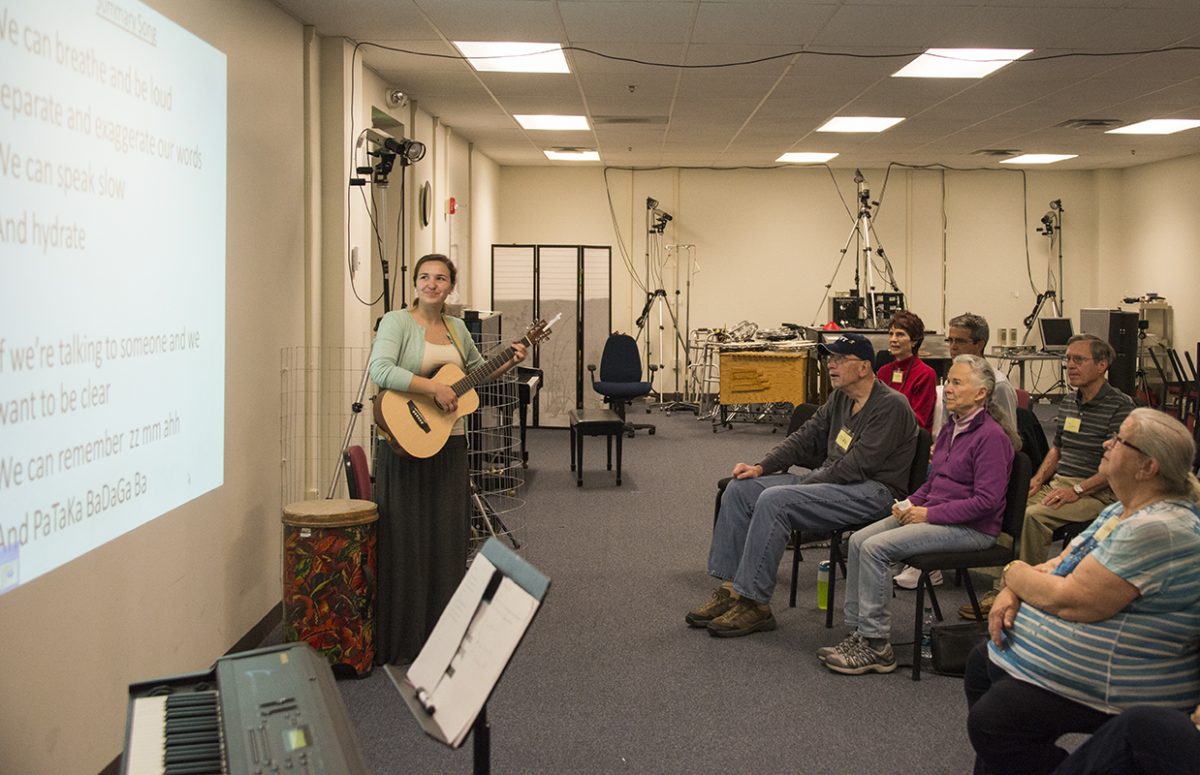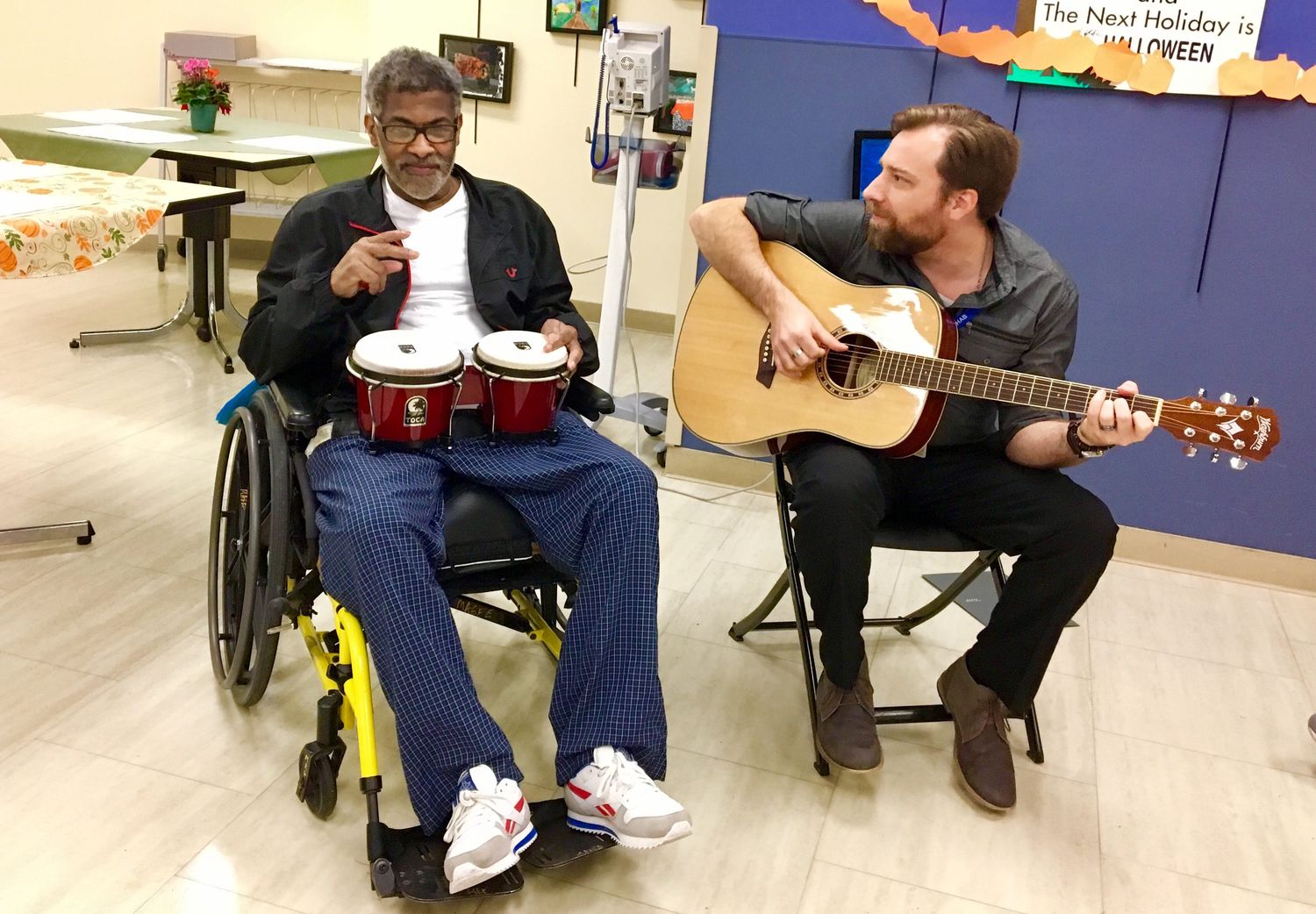Home>Events & Info>Music Therapy>What Is Music Therapy For Substance Abuse


Music Therapy
What Is Music Therapy For Substance Abuse
Published: February 2, 2024
Discover the power of music therapy for substance abuse treatment. Learn how music can be used as a therapeutic tool to promote healing and recovery.
(Many of the links in this article redirect to a specific reviewed product. Your purchase of these products through affiliate links helps to generate commission for AudioLover.com, at no extra cost. Learn more)
Table of Contents
- Introduction
- Understanding Substance Abuse
- What is Music Therapy?
- Benefits of Music Therapy for Substance Abuse
- How Does Music Therapy Work?
- Techniques Used in Music Therapy for Substance Abuse
- Case Studies and Success Stories
- Considerations for Implementing Music Therapy in Substance Abuse Treatment
- Conclusion
Introduction
Music has an incredible power to move us, to evoke emotion, and to create a sense of connection. It can lift our spirits, soothe our souls, and provide a much-needed escape from the challenges of day-to-day life. But did you know that music can also be a powerful tool in the treatment of substance abuse?
Substance abuse is a complex issue that affects individuals from all walks of life. It can have devastating effects on physical health, mental well-being, and personal relationships. Traditional forms of treatment, such as counseling and medication, play vital roles in recovery, but there is a growing recognition of the importance of incorporating alternative therapies into the treatment process. Music therapy is one such alternative that has gained traction in recent years.
So, what is music therapy? At its core, music therapy is the strategic use of music to accomplish therapeutic goals. It involves the trained use of musical interventions by a qualified music therapist to address the unique needs of individuals struggling with substance abuse. This form of therapy is not about simply listening to music for enjoyment, but rather about engaging with music in a deliberate and structured way to facilitate healing and growth.
Music therapy offers a range of benefits for individuals in recovery. Firstly, it provides a creative outlet for self-expression and emotional release. Many people in recovery struggle to articulate their emotions or find healthy ways to cope with them. Music serves as a universal language that can help individuals express their feelings, explore their experiences, and gain a deeper understanding of themselves.
Secondly, music therapy can aid in reducing stress and anxiety, which are common triggers for substance abuse. Listening to and participating in music has been shown to stimulate the release of endorphins, the brain’s natural feel-good chemicals. This can lead to a decrease in stress and an increase in relaxation, helping individuals manage their cravings and stay focused on their recovery goals.
Furthermore, music therapy can enhance the brain’s natural reward system, which is often compromised in individuals struggling with substance abuse. Engaging with music activates the pleasure centers in the brain and can provide a source of joy and fulfillment that is healthier and more sustainable than the temporary high of substance use.
Through this article, we will explore the benefits of music therapy for substance abuse, how it works, and the techniques used by music therapists. We will also delve into real-life case studies and success stories, as well as considerations for implementing music therapy in substance abuse treatment. By the end, you will have a deeper understanding of the profound impact that music therapy can have on individuals recovering from substance abuse, and the valuable role it plays in their journey towards a healthier and more fulfilling life.
Understanding Substance Abuse
Substance abuse is a widespread and complex issue that affects individuals of all ages, backgrounds, and socioeconomic statuses. It refers to the misuse or excessive use of substances such as alcohol, drugs (both prescription and illicit), and even certain behaviors like gambling. Substance abuse can have severe consequences on the physical, mental, and emotional well-being of the individuals involved, as well as their families and communities.
There are many factors that contribute to the development of substance abuse. It could stem from a genetic predisposition, ongoing exposure to trauma or stress, mental health disorders, or peer pressure. It often starts with experimentation, but can quickly spiral into addiction, where the individual becomes dependent on the substance and experiences withdrawal symptoms when they try to stop using it.
One of the challenges in addressing substance abuse is the stigma and shame associated with it. People struggling with addiction may face judgment and discrimination, making it difficult for them to seek help or even acknowledge their problem. It is important to approach substance abuse with compassion and understanding, recognizing that it is a complex issue that requires professional intervention.
In order to effectively address substance abuse, a comprehensive treatment approach is necessary. This typically involves a combination of therapies, such as counseling, medication, support groups, and alternative therapies like music therapy. The goal of treatment is not only to help individuals overcome their addiction, but also to address the underlying factors that contribute to it and equip them with the necessary tools for long-term recovery.
Substance abuse affects all aspects of a person’s life, from their physical health to their relationships and overall quality of life. It can lead to a decline in physical well-being, including organ damage, increased risk of accidents or overdose, and a weakened immune system. Mental health is also profoundly impacted, with substance abuse often co-occurring with mental health disorders such as depression, anxiety, or post-traumatic stress disorder (PTSD).
Furthermore, substance abuse can strain relationships and erode trust, leading to social isolation and difficulties in maintaining employment or educational pursuits. It can also result in financial instability, legal issues, and overall loss of personal fulfillment and purpose.
By understanding the complexities of substance abuse, we can better appreciate the need for holistic and personalized treatment approaches. Integration of alternative therapies, such as music therapy, into traditional treatment methods can provide a more well-rounded and effective approach to addressing the multifaceted challenges of substance abuse.
What is Music Therapy?
Music therapy is an evidence-based form of therapy that utilizes music to address the physical, emotional, cognitive, and social needs of individuals. It is provided by a trained and credentialed music therapist who uses various music-based interventions to support individuals in achieving their therapeutic goals.
Music therapy is distinct from simply listening to music or playing an instrument for leisure. It involves the intentional use of music to promote therapeutic outcomes. The therapist carefully selects and structures the music to meet the specific needs of each individual, whether it be reducing anxiety, improving communication skills, or enhancing self-expression. Sessions may involve listening to music, playing instruments, singing, creating music, writing lyrics, or engaging in movement activities.
One of the key principles of music therapy is the belief that music has a profound impact on our physical, emotional, and mental well-being. It can elicit powerful emotional responses, evoke memories, and facilitate self-exploration and healing. The therapist works collaboratively with the client to create a safe and supportive environment where they can engage with music in ways that facilitate personal growth and self-discovery.
Music therapy can be beneficial for individuals of all ages and abilities, from young children with developmental disabilities to older adults with neurodegenerative conditions. It is used in a variety of settings, including hospitals, rehabilitation centers, schools, mental health facilities, and substance abuse treatment programs.
In the context of substance abuse treatment, music therapy can be a powerful tool for individuals in recovery. It can provide an outlet for self-expression, help individuals cope with stress and cravings, and enhance feelings of self-esteem and empowerment. Engaging with music can also promote emotional regulation and provide an alternative source of pleasure and fulfillment.
Research has shown that music therapy can have a range of positive effects on individuals in substance abuse treatment. It has been found to reduce anxiety, depression, and overall psychological distress. It can also improve overall quality of life, self-awareness, and motivation for recovery. Additionally, music therapy can facilitate communication and social interactions, helping individuals rebuild and strengthen their support networks.
Overall, music therapy is a dynamic and versatile approach to healing that harnesses the power of music to address the unique needs and goals of individuals. It offers a non-verbal and creative modality of expression that can complement traditional talk therapy and provide a means for individuals to connect with their emotions, gain insight, and embrace their journey of recovery.
Benefits of Music Therapy for Substance Abuse
Music therapy offers a multitude of benefits for individuals in substance abuse recovery. It provides a unique and powerful approach to healing that can address the physical, emotional, and psychological aspects of addiction. Here are some key benefits of music therapy for substance abuse:
1. Emotional expression and regulation: Music therapy provides a safe and non-threatening avenue for individuals to express and process difficult emotions associated with addiction. Through music, they can explore complex feelings, release pent-up emotions, and gain a better understanding of themselves. Engaging with music can also help regulate emotions, reducing the risk of relapse triggered by emotional distress.
2. Stress and anxiety reduction: Substance abuse often co-occurs with high levels of stress and anxiety. Music therapy helps reduce these symptoms by promoting relaxation and providing a positive distraction. Listening to calming music or playing instruments can release endorphins, the body’s natural feel-good chemicals, leading to a decrease in stress, tension, and anxiety.
3. Coping skills development: One of the goals of substance abuse treatment is equipping individuals with healthy coping mechanisms to replace substance use. Music therapy offers a creative outlet for self-expression and emotional release, providing individuals with alternative ways to cope with cravings, stress, and triggers. Learning to use music as a tool for relaxation and emotional well-being can enhance resilience and assist in long-term recovery.
4. Cognitive enhancement: Addiction can impair cognitive functions, such as attention, memory, and problem-solving skills. Music therapy can help improve cognitive abilities by stimulating neural pathways in the brain. Engaging with rhythm, melody, and lyrics can enhance memory recall and strengthen cognitive functions, supporting overall cognitive rehabilitation in individuals in recovery.
5. Social connection and support: Addiction often isolates individuals from their social networks and support systems. Music therapy provides opportunities for individuals to connect with others in a non-judgmental and supportive environment. Group music therapy sessions foster a sense of belonging, encourage social interaction, and promote the development of healthy relationships with peers in recovery.
6. Motivation and self-esteem: Music therapy can boost motivation and self-esteem in individuals in recovery. Achieving success in creating or performing music can instill a sense of accomplishment and confidence. Setting and achieving musical goals can translate into the ability to set and achieve goals in other areas of life, fostering a sense of self-efficacy and purpose in the recovery journey.
These are just a few of the many benefits that music therapy can offer individuals in substance abuse recovery. By harnessing the therapeutic power of music, individuals can experience healing, personal growth, and enhanced well-being on their path to long-term recovery.
How Does Music Therapy Work?
Music therapy is a structured and evidence-based approach to healing that utilizes the power of music to address the unique needs of individuals in various therapeutic settings. It works by engaging individuals in a range of music-based interventions that are specifically tailored to their goals and needs. Here’s a closer look at how music therapy works:
1. Assessment: The first step in music therapy is conducting a thorough assessment of the individual’s needs, strengths, and preferences. The music therapist will gather information about the individual’s musical background, their emotional state, and their treatment goals. This assessment helps inform the development of a personalized treatment plan.
2. Musical interventions: Music therapy sessions may involve a variety of interventions, depending on the individual’s goals and preferences. These could include:
- Active music-making: Individuals may engage in playing instruments, singing, or songwriting. This allows for self-expression, creativity, and connection with their own emotions.
- Guided relaxation: Music therapists may use calming and soothing music to induce a state of relaxation and reduce stress and anxiety.
- Lyric analysis: Exploring the lyrics of songs can help individuals gain insight into their emotions, thoughts, and experiences. This can foster self-reflection and emotional growth.
- Movement to music: Engaging in rhythmic movement activities, such as dancing or drumming, can help individuals release tension, improve body awareness, and promote emotional and physical well-being.
- Improvisation: Creating music spontaneously allows individuals to explore their emotions and thoughts without the pressure of structured composition. It encourages self-expression and can be particularly effective for individuals with limited verbal communication skills.
3. Therapeutic relationship: The music therapist builds a therapeutic relationship with the individual, creating a safe and supportive environment where they can express themselves freely. The therapist listens attentively to the individual’s feelings and experiences, validates their emotions, and facilitates exploration and growth through music.
4. Goal-oriented approach: Music therapy is goal-oriented, meaning that the therapist and individual work together to establish specific objectives to be achieved through musical interventions. These goals can vary widely depending on the individual’s needs and may include improving emotional regulation, enhancing communication skills, developing coping strategies, or increasing self-esteem.
5. Integration with other therapies: Music therapy is often integrated with other traditional therapies, such as counseling or medication, to provide a comprehensive treatment approach. It can complement and enhance the effects of these therapies, offering a holistic and multi-dimensional healing experience for the individual in treatment.
6. Evaluation and progress monitoring: Throughout the course of music therapy, progress is regularly evaluated and monitored. The therapist assesses the individual’s response to interventions, tracks changes in their emotional well-being, and adjusts the treatment plan accordingly. Evaluation is an ongoing process to ensure that the therapy remains effective and aligned with the individual’s evolving needs.
Overall, music therapy works by harnessing the unique properties of music to facilitate emotional expression, self-exploration, and personal growth. The therapeutic relationship between the music therapist and the individual, coupled with the intentional use of music-based interventions, creates an environment where healing can occur on various levels – physical, emotional, cognitive, and social.
Techniques Used in Music Therapy for Substance Abuse
Music therapy employs a variety of techniques to address the specific needs of individuals in substance abuse treatment. These techniques are designed to facilitate emotional expression, promote relaxation, enhance self-awareness, and foster connection and healing. Here are some commonly used techniques in music therapy for substance abuse:
1. Songwriting: Songwriting allows individuals to express their experiences, thoughts, and emotions through the creation of original lyrics and melodies. This technique provides a creative outlet for self-expression and can help individuals explore their journey of addiction and recovery in a therapeutic and empowering way.
2. Guided Imagery and Music (GIM): GIM involves listening to carefully selected music while engaging in guided visualization exercises. The music serves as a backdrop for exploring memories, emotions, and personal imagery. GIM can be a powerful tool for individuals struggling with substance abuse, as it can help them uncover and process underlying emotional issues that contribute to their addictive behaviors.
3. Improvisation: Improvisation is the spontaneous creation of music in the moment. It allows individuals to freely express themselves without the constraints of structured composition. Improvisation can be particularly effective for individuals in substance abuse treatment, as it encourages self-expression, emotional release, and exploration of new ways of being in the world.
4. Lyric Analysis: Analyzing and discussing the lyrics of songs can be a powerful technique in music therapy for substance abuse. The therapist and individual explore the meanings and themes within the lyrics, relating them to the individual’s own experiences and emotions. This technique promotes self-reflection, insight, and the development of a deeper understanding of one’s own thoughts and behaviors.
5. Drumming: Drumming is a rhythmic and percussive activity that can be used in music therapy for substance abuse. Drum circles or individual drumming sessions can help individuals release emotions, reduce stress and anxiety, and improve concentration and focus. Drumming also promotes a sense of belonging and connection with others in a group setting.
6. Group Music Making: Group music making activities encourage individuals in substance abuse treatment to work collaboratively to create music. These activities can include group singing, playing instruments together, or composing music as a collective. Group music making fosters social interaction, communication, teamwork, and a sense of community and belonging among participants.
7. Relaxation and Guided Imagery: Music therapy incorporates relaxation techniques that utilize calming and soothing music to induce a state of relaxation. Guided imagery exercises may accompany the music, allowing individuals to imagine peaceful and serene scenes. Relaxation and guided imagery techniques help individuals reduce stress and anxiety, promote emotional well-being, and provide a healthy coping mechanism for managing triggers and cravings.
These are just a few examples of the techniques used in music therapy for substance abuse. The specific techniques implemented will depend on the individual’s goals, preferences, and therapeutic needs. The trained music therapist selects and adapts these techniques to create a customized and meaningful therapeutic experience that supports the individual’s recovery journey.
Case Studies and Success Stories
Music therapy has demonstrated its effectiveness in supporting individuals in substance abuse treatment through numerous case studies and success stories. These real-life examples highlight the transformative power of music therapy in the lives of those struggling with addiction. Here are a few noteworthy case studies:
Case Study 1 – John: John, a 32-year-old man dealing with a long-time addiction to opioids, participated in a music therapy program during his residential treatment. Through songwriting, John was able to express the pain and struggle he experienced throughout his addiction journey. The process not only facilitated emotional release but also enabled John to reflect on his past choices and envision a brighter future. With the support of the music therapist, John wrote uplifting and inspiring songs that served as a source of motivation, reminding him of his goals and the progress he had made.
Case Study 2 – Sarah: Sarah, a teenage girl battling alcohol addiction, engaged in drumming activities as part of her music therapy sessions. Drumming allowed Sarah to release anger and frustration in a healthy way and provided her with a sense of rhythm and structure. The repetitive and rhythmic nature of drumming helped Sarah regulate her emotions, reduce stress, and improve her focus. Furthermore, the group drumming sessions created a supportive atmosphere where Sarah connected with peers facing similar challenges, fostering a sense of community and belonging which was crucial to her recovery journey.
Success Story 1 – Mark: Mark had been struggling with substance abuse for several years and had unsuccessfully attempted various forms of treatment. When he started music therapy, he discovered a new avenue for emotional expression and self-discovery. Engaging in drumming and improvisation activities allowed Mark to tap into his creative side and access buried emotions. Through music therapy, Mark gained insights into the underlying causes of his addiction and developed coping strategies to prevent relapse. Music became a lifelong tool for self-care and personal growth for Mark, and he successfully maintained his sobriety long after completing his treatment program.
Success Story 2 – Kate: Kate, a middle-aged woman struggling with addiction to prescription medications, found solace in music therapy. During her sessions, she explored the lyrics of songs that resonated with her experiences, and engaged in guided imagery exercises while listening to calming music. This combination allowed Kate to delve deep into her emotions, confront past traumas, and develop healthier ways of managing triggers and stressors. Music therapy empowered Kate to make positive changes in her life, rebuild broken relationships, and rediscover her passion for music. Today, Kate continues to engage in music therapy and serves as an advocate for the transformative power of music in addiction recovery.
These case studies and success stories offer insight into the unique ways in which music therapy can support individuals in overcoming addiction. Through creative expression, emotional release, and the development of coping skills, music therapy helps individuals find new pathways to healing and empowers them to create a brighter future free from substance abuse.
Considerations for Implementing Music Therapy in Substance Abuse Treatment
Implementing music therapy as part of substance abuse treatment requires careful consideration of various factors to ensure its effectiveness and integration into the overall treatment plan. Here are some key considerations for implementing music therapy in substance abuse treatment:
1. Qualified Music Therapists: It is essential to engage qualified and credentialed music therapists who have received appropriate training and education in music therapy. They should have a deep understanding of substance abuse treatment and be skilled in adapting music therapy techniques to meet the specific needs of individuals in recovery.
2. Individualized Treatment Plans: Each person’s journey through addiction and recovery is unique. Music therapy should be tailored to the individual’s specific goals, preferences, and treatment plan. The therapist should collaborate with other treatment providers to ensure that music therapy aligns with the overall therapeutic approach and supports the individual’s recovery process.
3. Therapeutic Environment: Creating a safe and supportive environment is crucial for the success of music therapy in substance abuse treatment. The therapy space should be conducive to emotional expression, creativity, and confidentiality. Providing musical instruments, recording equipment, and a comfortable setting can enhance the therapeutic experience.
4. Integration with Other Therapies: Music therapy should be integrated with other evidence-based therapies used in substance abuse treatment. Collaboration between music therapists and other treatment providers, such as counselors and medical professionals, is important for a comprehensive and cohesive approach to recovery.
5. Group and Individual Sessions: Both group and individual music therapy sessions can be valuable in substance abuse treatment. Group sessions foster a sense of community, provide peer support, and promote social connection. Individual sessions allow for personalized attention, addressing specific needs, and providing a more focused therapeutic experience.
6. Consistency and Continuity: Consistency and continuity of music therapy sessions are important for progress and continuity of care. Regular sessions should be scheduled and maintained throughout the treatment period to allow individuals to fully engage in the therapeutic process and experience the long-term benefits of music therapy.
7. Ongoing Evaluation and Monitoring: Regular evaluation and monitoring of the effectiveness of music therapy are necessary to assess progress and make any necessary adjustments to the treatment plan. The therapist should gather feedback from individuals in treatment and collaborate with other treatment providers to ensure that the benefits of music therapy are maximized.
8. Ethical Considerations: Music therapists must adhere to ethical guidelines and standards when working with individuals in substance abuse treatment. Maintaining confidentiality, informed consent, and respecting cultural and personal boundaries are essential aspects of ethical practice in music therapy.
By carefully considering these factors, incorporating music therapy into substance abuse treatment can enhance the therapeutic process and contribute to the overall well-being and recovery of individuals. Music therapy provides a unique and powerful modality for self-expression, emotional processing, and personal growth that complements traditional treatment approaches and contributes to lasting change.
Conclusion
Music therapy offers a unique and powerful approach to healing for individuals in substance abuse treatment. Through the intentional use of music-based interventions, qualified music therapists can address the physical, emotional, cognitive, and social needs of individuals in recovery. Music therapy provides a safe and supportive environment for individuals to express themselves, process emotions, develop coping skills, and foster connection with others.
The benefits of music therapy for substance abuse treatment are wide-ranging. It can facilitate emotional expression and regulation, reduce stress and anxiety, develop healthy coping mechanisms, enhance cognition, and promote social connection and self-esteem. By incorporating music therapy into treatment, individuals can experience holistic healing, improve overall well-being, and enhance their chances of maintaining long-term recovery.
Implementing music therapy in substance abuse treatment requires careful consideration and collaboration. Qualified music therapists, individualized treatment plans, a therapeutic environment, integration with other therapies, group and individual sessions, ongoing evaluation, and adherence to ethical guidelines are crucial for the success of music therapy.
Real-life case studies and success stories highlight the transformative impact of music therapy on individuals in recovery. From songwriting and improvisation to guided imagery and drumming, music therapy empowers individuals to express themselves, explore their emotions, and engage in self-discovery. It provides a creative and meaningful outlet for personal growth and offers a sense of connection and community among peers.
In conclusion, music therapy is an invaluable addition to substance abuse treatment. Its ability to harness the power of music to promote healing, emotional well-being, and personal growth cannot be overstated. By incorporating music therapy into treatment programs, individuals in recovery have the opportunity to find their voices, access their emotions, and embark on a transformative journey towards lasting sobriety and fulfillment.











